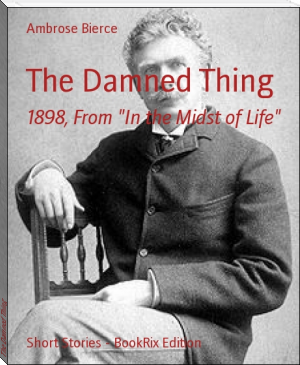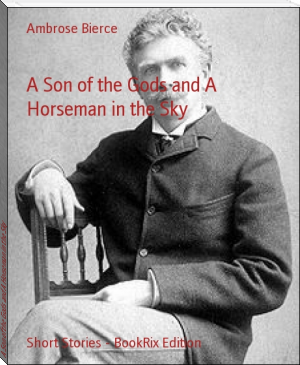Can Such Things Be? by Ambrose Bierce (popular books of all time .TXT) 📖

- Author: Ambrose Bierce
Book online «Can Such Things Be? by Ambrose Bierce (popular books of all time .TXT) 📖». Author Ambrose Bierce
You know, good friend, what had occurred there. In one chamber lay Julia Margovan, hours dead by poison; in another John Stevens, bleeding from a pistol wound in the chest, inflicted by his own hand. As I burst into the room, pushed aside the physicians and laid my hand upon his forehead he unclosed his eyes, stared blankly, closed them slowly and died without a sign.
I knew no more until six weeks afterward, when I had been nursed back to life by your own saintly wife in your own beautiful home. All of that you know, but what you do not know is this--which, however, has no bearing upon the subject of your psychological researches--at least not upon that branch of them in which, with a delicacy and consideration all your own, you have asked for less assistance than I think I have given you:
One moonlight night several years afterward I was passing through Union square. The hour was late and the square deserted. Certain memories of the past naturally came into my mind as I came to the spot where I had once witnessed that fateful assignation, and with that unaccountable perversity which prompts us to dwell upon thoughts of the most painful character I seated myself upon one of the benches to indulge them. A man entered the square and came along the walk toward me. His hands were clasped behind him, his head was bowed; he seemed to observe nothing. As he approached the shadow in which I sat I recognized him as the man whom I had seen meet Julia Margovan years before at that spot. But he was terribly altered--gray, worn and haggard. Dissipation and vice were in evidence in every look; illness was no less apparent. His clothing was in disorder, his hair fell across his forehead in a derangement which was at once uncanny and picturesque. He looked fitter for restraint than liberty--the restraint of a hospital.
With no defined purpose I rose and confronted him. He raised his head and looked me full in the face. I have no words to describe the ghastly change that came over his own; it was a look of unspeakable terror--he thought himself eye to eye with a ghost. But he was a courageous man. "Damn you, John Stevens!" he cried, and lifting his trembling arm he dashed his fist feebly at my face and fell headlong upon the gravel as I walked away.
Somebody found him there, stone-dead. Nothing more is known of him, not even his name. To know of a man that he is dead should be enough.
THE HAUNTED VALLEY
I--HOW TREES ARE FELLED IN CHINA
A half-mile north from Jo. Dunfer's, on the road from Hutton's to Mexican Hill, the highway dips into a sunless ravine which opens out on either hand in a half-confidential manner, as if it had a secret to impart at some more convenient season. I never used to ride through it without looking first to the one side and then to the other, to see if the time had arrived for the revelation. If I saw nothing--and I never did see anything--there was no feeling of disappointment, for I knew the disclosure was merely withheld temporarily for some good reason which I had no right to question. That I should one day be taken into full confidence I no more doubted than I doubted the existence of Jo. Dunfer himself, through whose premises the ravine ran.
It was said that Jo. had once undertaken to erect a cabin in some remote part of it, but for some reason had abandoned the enterprise and constructed his present hermaphrodite habitation, half residence and half groggery, at the roadside, upon an extreme corner of his estate; as far away as possible, as if on purpose to show how radically he had changed his mind.
This Jo. Dunfer--or, as he was familiarly known in the neighborhood, Whisky Jo.--was a very important personage in those parts. He was apparently about forty years of age, a long, shock-headed fellow, with a corded face, a gnarled arm and a knotty hand like a bunch of prison-keys. He was a hairy man, with a stoop in his walk, like that of one who is about to spring upon something and rend it.
Next to the peculiarity to which he owed his local appellation, Mr. Dunfer's most obvious characteristic was a deep-seated antipathy to the Chinese. I saw him once in a towering rage because one of his herdsmen had permitted a travel-heated Asian to slake his thirst at the horse-trough in front of the saloon end of Jo.'s establishment. I ventured faintly to remonstrate with Jo. for his unchristian spirit, but he merely explained that there was nothing about Chinamen in the New Testament, and strode away to wreak his displeasure upon his dog, which also, I suppose, the inspired scribes had overlooked.
Some days afterward, finding him sitting alone in his barroom, I cautiously approached the subject, when, greatly to my relief, the habitual austerity of his expression visibly softened into something that I took for condescension.
"You young Easterners," he said, "are a mile-and-a-half too good for this country, and you don't catch on to our play. People who don't know a Chileno from a Kanaka can afford to hang out liberal ideas about Chinese immigration, but a fellow that has to fight for his bone with a lot of mongrel coolies hasn't any time for foolishness."
This long consumer, who had probably never done an honest day's-work in his life, sprung the lid of a Chinese tobacco-box and with thumb and forefinger forked out a wad like a small haycock. Holding this reinforcement within supporting distance he fired away with renewed confidence.
"They're a flight of devouring locusts, and they're going for everything green in this God blest land, if you want to know."
Here he pushed his reserve into the breach and when his gabble-gear was again disengaged resumed his uplifting discourse.
"I had one of them on this ranch five years ago, and I'll tell you about it, so that you can see the nub of this whole question. I didn't pan out particularly well those days--drank more whisky than was prescribed for me and didn't seem to care for my duty as a patriotic American citizen; so I took that pagan in, as a kind of cook. But when I got religion over at the Hill and they talked of running me for the Legislature it was given to me to see the light. But what was I to do? If I gave him the go somebody else would take him, and mightn't treat him white. WHAT was I to do? What would any good Christian do, especially one new to the trade and full to the neck with the brotherhood of Man and the fatherhood of God?"
Jo. paused for a reply, with an expression of unstable satisfaction, as of one who has solved a problem by a distrusted method. Presently he rose and swallowed a glass of whisky from a full bottle on the counter, then resumed his story.
"Besides, he didn't count for much--didn't know anything and gave himself airs. They all do that. I said him nay, but he muled it through on that line while he lasted; but after turning the other cheek seventy and seven times I doctored the dice so that he didn't last forever. And I'm almighty glad I had the sand to do it.
Jo.'s gladness, which somehow did not impress me, was duly and ostentatiously celebrated at the bottle.
"About five years ago I started in to stick up a shack. That was before this one was built, and I put it in another place. I set Ah Wee and a little cuss named Gopher to cutting the timber. Of course I didn't expect Ah Wee to help much, for he had a face like a day in June and big black eyes--I guess maybe they were the damn'dest eyes in this neck o' woods."
While delivering this trenchant thrust at common sense Mr. Dunfer absently regarded a knot-hole in the thin board partition separating the bar from the living-room, as if that were one of the eyes whose size and color had incapacitated his servant for good service.
"Now you Eastern galoots won't believe anything against the yellow devils," he suddenly flamed out with an appearance of earnestness not altogether convincing, "but I tell you that Chink was the perversest scoundrel outside San Francisco. The miserable pigtail Mongolian went to hewing away at the saplings all round the stems, like a worm o' the dust gnawing a radish. I pointed out his error as patiently as I knew how, and showed him how to cut them on two sides, so as to make them fall right; but no sooner would I turn my back on him, like this"--and he turned it on me, amplifying the illustration by taking some more liquor--"than he was at it again. It was just this way: while I looked at him, SO"--regarding me rather unsteadily and with evident complexity of vision--"he was all right; but when I looked away, SO"--taking a long pull at the bottle--"he defied me. Then I'd gaze at him reproachfully, SO, and butter wouldn't have melted in his mouth."
Doubtless Mr. Dunfer honestly intended the look that he fixed upon me to be merely reproachful, but it was singularly fit to arouse the gravest apprehension in any unarmed person incurring it; and as I had lost all interest in his pointless and interminable narrative, I rose to go. Before I had fairly risen, he had again turned to the counter, and with a barely audible "so," had emptied the bottle at a gulp.
Heavens! what a yell! It was like a Titan in his last, strong agony. Jo. staggered back after emitting it, as a cannon recoils from its own thunder, and then dropped into his chair, as if he had been "knocked in the head" like a beef--his eyes drawn sidewise toward the wall, with a stare of terror. Looking in the same direction, I saw that the knot-hole in the wall had indeed become a human eye--a full, black eye, that glared into my own with an entire lack of expression more awful than the most devilish glitter. I think I must have covered my face with my hands to shut out the horrible illusion, if such it was, and Jo.'s little white man-of-all-work coming into the room broke the spell, and I walked out of the house with a sort of dazed fear that delirium tremens might be infectious. My horse was hitched at the watering-trough, and untying him I mounted and gave him his head, too much troubled in mind to note whither he took me.
I did not know what to think of all this, and like every one who does not know what to think I thought a great deal, and to little purpose. The only reflection that seemed at all satisfactory, was, that on the morrow I should be some miles away, with a strong probability of never returning.
A sudden coolness brought me out of my abstraction, and looking up I found





Comments (0)